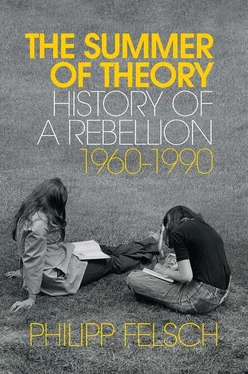248 306
249 307
250 308
251 309
252 310
253 311
254 312
255 313
256 314
257 315
258 316
259 317
260 318
261 319
262 320
263 321
264 322
265 323
266 324
267 325
268 326
269 327
270 328
271 329
272 330
273 331
274 332
275 333
276 334
The Summer of Theory
History of a Rebellion, 1960–1990
PHILIPP FELSCH
Translated by Tony Crawford
polity
Originally published in German as Der lange Sommer der Theorie by Philipp Felsch © Verlag C. H. Beck oHG, Munich 2015
This English edition © 2022 by Polity Press
The translation of this work was funded by Geisteswissenschaften International – Translation Funding for Work in the Humanities and Social Sciences from Germany, a joint initiative of the Fritz Thyssen Foundation, the German Federal Foreign Office, the collecting society VG WORT and the Börsenverein des Deutschen Buchhandels (German Publishers & Booksellers Association).
Front endpaper: Sector boundary at Wilhemstrasse, Berlin, 1960. Copyright © Shawn McBride / Will McBride Archive
Back endpaper: The Gropius Building next to the Berlin Wall, Berlin, early 1980s © DACS, 2021
Polity Press
65 Bridge Street
Cambridge CB2 1UR, UK
Polity Press
101 Station Landing
Suite 300
Medford, MA 02155, USA
All rights reserved. Except for the quotation of short passages for the purpose of criticism and review, no part of this publication may be reproduced, stored in a retrieval system or transmitted, in any form or by any means, electronic, mechanical, photocopying, recording or otherwise, without the prior permission of the publisher.
ISBN-13: 978-1-5095-3985-7
A catalogue record for this book is available from the British Library.
Library of Congress Cataloging-in-Publication Data
Names: Felsch, Philipp, author. | Crawford, Tony (Translator) translator.
Title: The summer of theory : history of a rebellion, 1960-1990 / Philipp Felsch ; translated by Tony Crawford.
Other titles: Lange Sommer der Theorie. English | History of a rebellion, 1960-1990
Description: English edition. | Cambridge, UK ; Medford, MA : Polity, [2021] | “Originally published in German as ‘Der lange Sommer der Theorie’ by Philipp Felsch, Verlag C. H. Beck oHG, München, 2015.” | Includes bibliographical references and index. | Summary: “The story of how the German Left fell in love with theory”-- Provided by publisher.
Identifiers: LCCN 2021009973 (print) | LCCN 2021009974 (ebook) | ISBN 9781509539857 (hardback) | ISBN 9781509539871 (epub)
Subjects: LCSH: Germany (West)--Intellectual life--20th century. | Germany (West)--Politics and government--1945-1990. | Intellectuals--Germany (West)--History--20th century. | Books and reading--Germany (West) | Germany (West)--Intellectual life--French influences.
Classification: LCC DD260.3 .F4513 2021 (print) | LCC DD260.3 (ebook) | DDC 305.5/52094309045--dc23
LC record available at https://lccn.loc.gov/2021009973
LC ebook record available at https://lccn.loc.gov/2021009974
by Fakenham Prepress Solutions, Fakenham, Norfolk NR21 8NL
The publisher has used its best endeavours to ensure that the URLs for external websites referred to in this book are correct and active at the time of going to press. However, the publisher has no responsibility for the websites and can make no guarantee that a site will remain live or that the content is or will remain appropriate.
Every effort has been made to trace all copyright holders, but if any have been overlooked the publisher will be pleased to include any necessary credits in any subsequent reprint or edition.
For further information on Polity, visit our website: politybooks.com
‘We are obsessive readers.’
Heidi Paris
(1950–2002)
and
Peter Gente
(1936–2014)
1 Wilhemstrasse sector boundary, Berlin, 1960. © Shawn McBride / Will McBride Archive.
2Heidi Paris and Peter Gente, West Berlin, around 1980. From Der Spiegel , 53 (1980). Photo by W. Herrmann, Berlin.
3Peter Gente goes to the cinema, 1956. © Benjamin Gente.
4Layers of time in Berlin: ‘Trümmerfrauen’ clearing away the rubble for the reconstruction of the Hansaviertel, 1957. © Landesarchiv Berlin, F Rep. 290 Nr 0052363 / photographer: Gert Schütz.
5Althusser, Für Marx , Frankfurt: Suhrkamp, 1968 (see Appendix for translation). Photo © Christian Werner, Berlin.
6Charles Bettelheim, Über das Fortbestehen von Warenverhältnissen in den ‘sozialistischen Ländern’ [On the persistence of commodity relations in the ‘socialist countries’], Berlin: Merve, 1970 (see Appendix for translation). This stapled booklet was the first publication to bear the name ‘Merve Verlag’. © Merve Verlag. Photos by Christian Werner, Berlin.
7 Oskar Negt and Alexander Kluge, Öffentlichkeit und Erfahrung [ Public Sphere and Experience ], Frankfurt: Suhrkamp, 1972 (see Appendix for translation). A preliminary draft was circulated among the Merve collective before publication. © ZKM Karlsruhe, Merve-Archiv. Photo by Franz Wamhof, Karlsruhe.
8 Jean-François Lyotard, Das Patchwork der Minderheiten [The patchwork of minorities], Berlin: Merve, 1977 (see Appendix for translation). © Merve Verlag. Photos by Christian Werner, Berlin.
9 Pages 6 and 7 of Gilles Deleuze and Félix Guattari, Anti-Oedipus , trans. Bernd Schwibs, Winterthur: Suhrbier, 1974 (see Appendix for translation). Peter Gente and Heidi Paris struggled through this pirate edition for five years. © ZKM Karlsruhe, Merve-Archiv / Man Ray Trust, Paris / VG Bild-Kunst, Bonn, 2015. Photo by Franz Wamhof, Karlsruhe.
10 Peter Gente (second from left) reading Mille plateaux by Gilles Deleuze and Félix Guattari, Poland, 1994. © Benjamin Gente.
11 Michel Foucault in West Berlin, Güntzelstrasse, Pension Finck, 1978 (see Appendix for translation). © ZKM Karlsruhe, Merve-Archiv. Photo by Franz Wamhof, Karlsruhe.
12 Michel Foucault and Heidi Paris at the Tunix Conference, Berlin, 1978. © Ulrich Raulff, Marbach.
13 Michel Foucault and Peter Gente at the Tunix Conference, Berlin, 1978. © Ulrich Raulff, Marbach.
14 Traverses: Revue trimestrielle , 32 (1984) (see Appendix for translation). Photo by Christian Werner, Berlin.
15 Architectural misunderstandings would like to become a book: Martin Kippenberger sends greetings from Tenerife, 1987 (see Appendix for translation). © Estate of Martin Kippenberger, Galerie Gisela Capitain, Cologne.
16 The site of Berlin’s former central railway station, Anhalter Bahnhof, 1980s. © DACS, 2021.
17 Endpapers of Ernst Jünger, Auf den Marmorklippen , Hamburg: Hanseatische Verlagsanstalt, 1939. Photo by Christian Werner, Berlin.
18 The Wild Academy at the buffet, Kassel, 1984. © Dieter Schwerdtle, Kassel, Germany.
19 Dirk Baecker proposes Luhmann’s interviews to Merve (see Appendix for translation). © Dirk Baecker / ZKM Karlsruhe, Merve-Archiv. Photo by Franz Wamhof, Karlsruhe.
20 In the original Dschungel at Winterfeldplatz, 1976. © bpk / Esther Colton.
21 The Gropius Building next to the Berlin Wall, Berlin, early 1980s. © DACS, 2021.
Although this book is mainly based on a composite of written records, it would not have been possible without numerous conversations. I thank the following people for their willingness to answer my questions: Hannes Böhringer, Peter Geble, Peter Gente†, Wolfgang Hagen, Marianne Karbe, Helmut Lethen, Michaela Ott, Wolfert von Rahden, Ulrich Raulff, Hans-Jörg Rheinberger, Cord Riechelmann, Henning Schmidgen, Edith Seifert, Walter Seitter, Georg Stanitzek, Jochen Stankowski, Ronald Voullié, Nikolaus Wegmann and all the others who have talked to me in the past few years about their experiences with theory. I especially thank Tom Lamberty and Elisa Barth of Merve Verlag for their generous help and support. My heartfelt thanks go to Stephan Schlak for the initial impulse that led to this book. I thank the staff of the Centre for Art and Media Technology in Karlsruhe, the Walter Benjamin Archives (where there are photocopies of Adorno’s correspondence), the German Literature Archives in Marbach and the University Archives of Freie Universität, Berlin. I would not have been able to finish the book without a sabbatical semester funded by the Excellence Initiative of Humboldt-Universität, Berlin. For their critical reading and crucial suggestions, I thank Philipp Albers, Jan von Brevern, Martin Engelmeier, Martin Mittelmeier, Jan Mollenhauer, Moritz Neuffer, Kathrin Passig, Cornelius Reiber, Johanna Seifert and, most of all, Hanna Engelmeier. I thank Christian Werner for his dedicated photography. I thank Stefanie Hölscher for her great interest in this project. And I thank Yael Reuveny and Anne Henk for everything else.
Читать дальше












